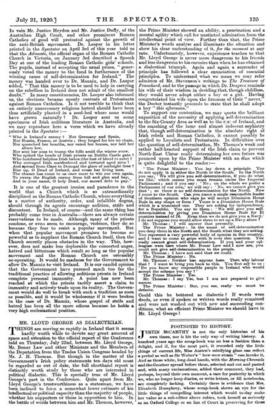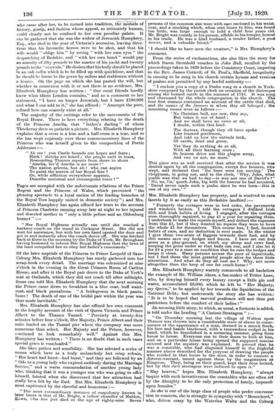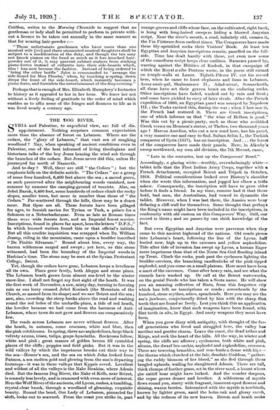FOOTNOTES TO HISTORY.
JUSTIN MoCARTHY is not the only historian of his own times, nor is his the only way of writing history. A hundred years, ago the scrap-book was no less a fashion than a delight, and if, for the most pait, it recorded only the little things of current life, Miss Austen's minifying glass ean reflect a period as well as Sir Walter's " bow-wow strain" can invoke it. And as those white, long-dead hands, with the Morning Chronicle and the Gazetteer spread before them, selected and cut and pasted and, with many exclamations, added their comment, they had, perhaps, beyond their own moment, a care for posterity in which we, who no longer keep diaries, or write letters, or fill notebooks, are completely lacking. Certainly there is evidence that Mrs. Elizabeth Humphrey, whose scrap-book shows an eye for the little things of compelling interest which would to-day make her value as a sub-editor above rubies, took herself as seriously as an Oxford College or an Inn of Court in preserving for those JUSTIN MoCARTHY is not the only historian of his own times, nor is his the only way of writing history. A hundred years, ago the scrap-book was no less a fashion than a delight, and if, for the most pait, it recorded only the little things of current life, Miss Austen's minifying glass ean reflect a period as well as Sir Walter's " bow-wow strain" can invoke it. And as those white, long-dead hands, with the Morning Chronicle and the Gazetteer spread before them, selected and cut and pasted and, with many exclamations, added their comment, they had, perhaps, beyond their own moment, a care for posterity in which we, who no longer keep diaries, or write letters, or fill notebooks, are completely lacking. Certainly there is evidence that Mrs. Elizabeth Humphrey, whose scrap-book shows an eye for the little things of compelling interest which would to-day make her value as a sub-editor above rubies, took herself as seriously as an Oxford College or an Inn of Court in preserving for those
who came after her, to be turned into tradition, the monsels of history, gossip, and fashion whose appeal, so intimately human, could clearly not be confined to her own peculiar palate. It can be gathered that she was the widow of Jeremiah Humphrey, Esq., who died in the year of Victoria's accession, leaving direc- tions that his favourite horses were to be shot, and that his wife would " oblige him " by seeing " with her own eyes " the despatching of Redskin, and " with her own hand " would pay an annuity of fifty pounds to the master of his yacht and twenty pounds to the " coxwaiii." He desires that his body should be placed in an oak coffin which is to be filled up with quicklime, and that he should be borne to the grave by sailors and stablemen without a hears'. On the page on which she has pasted the will, but whether in connexion with it or not there is no evidence, Mrs. Elizabeth Humphrey has written : " Our rural friends hardly know what idiots London contains," and as a comment to her statement, " I have no longer Jeremiah, but I have £100,000 and what I can add to it," she has affixed : " Amongst the poor, refined love can scarcely exist at all."
The majority of the cuttings refer to the movements of the Royal House. There is here everything relating to the death of the Princess Amelia, that " father's darling " of whom Thackeray drew so pathetic a picture. Mrs. Elizabeth Humphrey explains that a cross is a kiss and a half-cross is a tear, and so she has wept copiously over these commemoratory lines of the Princess who was herself given to the composition of Poetic Addresses :—
" Ah me ! yon Castle bounds our hopes and fears ; Hark ! shrieks are hdard ; the people melt in tears,
Resounding Thames repeats from shore to shore Amelia, lov'd Amelia is no more ! '
The nation grieves, but ah ! who can aspire To paint the sorrow of her Royal Sire ?
Or, while affliction everywhere appears,
Describe maternal and consanguine tears ? "
Pages are occupied with the unfortunate relations of the Prince Regent and the Princess of Wales, which prevented " the pleasing spectacle to a loyal nation of the leading branches of the Royal Tree happily united in domestic society "; and Mrs. Elizabeth Humphrey has again affixed her tears to the account of Princess Charlotte running away late at night to her injured and deserted mother in " only a little pelisse and an Oldenburg bonnet " :-
" Her Royal Highness actually ran until she reached a hackney-coach on the stand in Cockspur Street. She did not wait for assistance, but with her own hand opened the door and got in and instantly after the coach drove off. She was fetched back at three in the morning by the Duke of York, Mr. Brougham having hastened to inform Her Royal Highness that the laws of the land compelled her to obey her father's commands."
Of the later nuptials of the Princess to Prince Leopold of Saxe- Coburg Mrs. Elizabeth Humphrey has surely gathered into her scrap-book every detail. The marriage was solemnized at nine o'clock in the evening in the Great Crimson Room of Carlton House, and after it the Royal pair drove to the Duke of York's seat at Oatlands, which they did not reach till after midnight. Some one told Mrs. Elizabeth Humphrey that the next morning the Prince came down to breakfast in a blue coat, buff waist- coat, and black pantaloons. " A bridegroom in black panta- loons ! The death of one of the bridal pair within the year was thus made inevitable."
Mrs. Elizabeth Humphrey has also affixed her own comment to the lengthy account of the visit of Queen Victoria and Prince Albert to the Thames Tunnel. " Precisely at twenty-five minutes before four o'clock, Her Majesty, Prince Albert and their suite landed on the Tunnel pier where the company was more numerous than select. Her Majesty and the Prince, however, continued to look remarkably well." Against this Mrs. Humphrey has written : " There is no doubt that in such cases special grace is vouchsafed."
She likes pathos and sensibility. She has selected a series of verses which have as a truly melancholy but crisp refrain, " Her heart had burst—had burst," and they are followed by an " Ode to a young lady who expired suddenly during the Marriage Service," and a warm commendation of another young lady who, thinking that it was a younger son who was going to offer himself, fainted when she discovered that her attraction had really been felt by the Earl. But Mrs. Elizabeth Humphrey is most captivated by the cheerful and humorous :-
" The most extraordinary instance of corpulency known in later times is that of Mr. Bright, a tallow chandler of Malden, Essex, who has just died at the age of eighty-nine. Seven persons of the common size were with ease enclosed in his waist. coat, and a stocking which, when sent home to him, was found too little, was large enough to hold a child four years cld. Mr. Bright was comely in his person, affable in his temper, honest in his trade. He was a kind husband, a tender father, a good dancer, and a valuable friend."
` I should like to have seen the creature," is Mrs. Humphrey's comment.
From the series of exclamations, she also likes the story for which Baron Sternhold vouches in John Bull, recalled by the proceedings taken in 1820 before the Consistory Court, imputing to the Rev. James Cotteril, of St. Paul's, Sheffield, irregularity in causing to be sung in his church certain hymns and versions of psalms not permitted by any lawful authority :— " I enclose you a copy of a Psalm sung at a church in York- shire composed by the parish clerk on occasion of the distemper among the horned cattle in the summer of 1784. It was sung and chorussed by the whole congregation in the church. The four first stanzas contained an account of the cattle that died, and the names of the farmers to whom they all belonged ; the remaining verses were as follows
No Christian bull, nor cow, they say, But takes it out of hand ; And we shall have no cows at all, I doubt, within this land.
The doctors, though they all have spoke Like learned gentlemen, And told us how the entrails look, Of cattle, dead and green.
Yet they do ncthing do at all, With all their learning store ;
So heaven drive out this plague away,
And vex u s not, no more.'
This piece was so well received that after the service it was desired again by all the congregation, except five farmers, who wept, and declared that ` the lines were too moving.' The clergyman, in going out, said to the clerk, Why, John, what psalm was that we had to-day—it was not one of David's ? '
No, no, Sir,' quoth John, big with the honour he had acquired,
David never made such a psalm since he was born—this is one of my own.' " Mrs. Elizabeth Humphrey has property, and is resolved to earn laurels by it as easily as this Berkshire landlord :— " Formerly the cottages were in bad order, the pavements and windows broken. I told the cottagers I disliked Irish filth and Irish habits of living. I engaged, after the cottages were thoroughly repaired, to pay £1 a year for repairing them. I undertook to make the repairs myself, and deduct the expenses from this £1, but if they wanted no repairs they were to have the whole £1 for themselves. This course has, I find, formed habits of care, and no deduction is ever made. In the winter I -give them two-score of faggots towards their fuel, and by this means save my hedges and fences. I have set out four acres as a play-ground, on which my sheep and cows feed, keeping the grass under so that balls can run, and I also let it for £4 a year to a man on condition that he cuts the hedges and keeps it clean. Many persons accuse the poor of ingratitude, but I find them the most grateful people alive for these little attentions. And what do they all cost me ? Why, not more altogether than the keep of one fat coach-horse ! "
Mrs. Elizabeth Humphrey warmly commends to all bachelors the example of Mr. William Akers, a fan-maker of Fetter Lane, who, by denying himself every luxury except a little gin and water, accumulated £6,000, which he left to " Her Majesty, my Queen," to be applied by her towards the liquidation of the National Debt; but underneath the story she has written: " It is to be hoped that married gentlemen will not thus put patriotism before the comfort of their ladies ! "
An amusing little story, to which, as usual, a footnote is added, is told under the heading " A Curious Stratagem " :—
" On Thursday morning last the village of Walton upon Thames was thrown into a considerable state of alarm in conse- quence of the appearance of a man, dressed in a smock frock, his face and hands blackened, with a tremendous cudgel in his hand, which he brandished in a menacing manner, going from house to house. Everyone ran to their doors to look at him, and on a particular house being opened the supposed maniac entered and the mystery was explained. It proved that he was a constable, who had disguised himself in the frightful manner above described for the purpose of drawing the people who resided in that house to the door, in order to execute a distress-warrant, issued against them by the magistrates at Kingston. They, being on their guard, kept their door locked, but by this clerk stratagem were induced to open it."
" May heaven," hopes Mrs. Elizabeth Humphrey, " always inspire with such inventiveness the constables who are often set by the Almighty to be the only protection of lonely, imposed- upon females."
As she is one of the large class of people who prefer conversa- tion to concerts, she is strongly in sympathy with "Monoehord," who, driven crazy by the Waterloo Waltz and the Coburg
Cotillon, writes to the Morning Chronicle to suggest that no gentleman or lady shall be permitted to perform in private with- out a licence to be taken out annually in the same manner as that for wearing hair-powder :—
" Those unfortunate gentlemen who have more than one musical wife [sic] and three unmarried musical daughters shall be subject to a modification of the duty, and though the tax may not knock pianos on the head so much as it has knocked hair- powder out of it, it may prevent cabinet-makers from sticking piano-fortes instead of cellarets into their side-boards which, alas ! has now become the fashion. Instead of being ordered to ' bring the other bottle ' John is commanded to ' arrange the side-board for Miss Phoebe,' when, by touching aaspring, down drops the front of the side-board, which instantly becomes a piano-forte, and furnishes the entertainment of the long evening."
Perhaps that is enough of Mrs. Elizabeth Humphrey's footnotes to history as it appealed to her in her hour. We leave her not without a lively feeling of gratitude to the order of mind which enables us to affix some of the fringes and flounces to life as it was lived nearly a century ago.




































 Previous page
Previous page